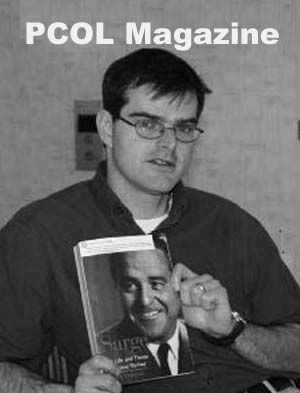
Biography, in our contemporary understanding of it, has a capacious range, embracing everything from Plutarch’s “Lives” and the New Testament to St. Augustine’s “Confessions” and the E! television network’s “True Hollywood Story.” But a tension has haunted the biographic impulse from the very beginning. Is the primary function of biography to idealize and commemorate figures in order to provide models for emulation? Or is it to capture the warts-and-all essence of an individual human personality in a way that engages the sympathy and deepens the self-understanding of those who encounter it? This in turn generates another tension, one that has particular currency today: to what extent must biography, to be worthy of its name, be based on knowable fact, and to what extent does a full picture of a human personality depend on speculation, symbolism and fictionalization? As Hamilton puts it, “Where does fact end and interpretation begin?” Is biography “a branch of history” or “an art of human portraiture”? Scott Stosell is the authorized biographer of Founding Peace Corps Director Sargent Shriver.
Scott Stossel writes: Whose Life Is It?
Whose Life Is It?
Rodrigo Corral Design
By SCOTT STOSSEL
Published: March 18, 2007
[Excerpt]
Poor Nigel Hamilton; he’s having a bad run of luck with big biographical projects. After publishing a respected three-volume biography of the British field marshal Bernard Montgomery, he embarked on the first book of a projected three-volume work on John F. Kennedy. “JFK: Reckless Youth” (1992) was a salacious but well-researched and insightful book about Kennedy’s early years. The experience of writing it, however, was so harrowing for Hamilton (he felt hazed by the “toadies” of the Kennedy family, he said, and had been thwarted by the “fascistic spirit” of the “family loyalists” at the John F. Kennedy library in Boston) that he gave up after just one volume. After “Bill Clinton: American Journey,” the first of a projected two-volume biography, took a critical pounding in 2003 (Michiko Kakutani, writing in The Times, called it “a sleazy new low in the chronicling of presidential lives”) it was an open question whether Hamilton would again feel moved to give up after one book.
But he seems to be gamely forging ahead: “Bill Clinton: Mastering the Presidency” is slated for publication this summer. In the meantime Hamilton has written “Biography: A Short History,” which might be thought of as a kind of palate cleanser (no doubt Hamilton wants to wash away the bad taste of those reviews). Naturally, one wonders to what degree the main thrust of this book — an apologia for the art of biography — is really an apologia for the art of biography as practiced by Nigel Hamilton. But in any case, he has produced a rich and provocative meditation on the history of biography, albeit one marred by an overblown central argument.
Biography, in our contemporary understanding of it, has a capacious range, embracing everything from Plutarch’s “Lives” and the New Testament to St. Augustine’s “Confessions” and the E! television network’s “True Hollywood Story.” But a tension has haunted the biographic impulse from the very beginning. Is the primary function of biography to idealize and commemorate figures in order to provide models for emulation? Or is it to capture the warts-and-all essence of an individual human personality in a way that engages the sympathy and deepens the self-understanding of those who encounter it? This in turn generates another tension, one that has particular currency today: to what extent must biography, to be worthy of its name, be based on knowable fact, and to what extent does a full picture of a human personality depend on speculation, symbolism and fictionalization? As Hamilton puts it, “Where does fact end and interpretation begin?” Is biography “a branch of history” or “an art of human portraiture”?
You would be forgiven for imagining that these questions have come to the fore in only the last 10 years, a decade that has brought us Edmund Morris’s “Dutch” (the official Reagan biography, in which the author inserted himself as a fictional character) and James Frey’s “Million Little Pieces” (a “memoir” that turned out to be largely fictionalized), not to mention an avalanche of the kind of gossipy and dysfunction-obsessed life-writing that the novelist and critic Joyce Carol Oates has labeled “pathography.”
But similar questions surround the earliest written biographical material on record. The Epic of Gilgamesh, etched on clay tablets sometime before 2000 B.C., recounts the tragic adventures of a Sumerian king and his best friend. What’s not known is whether the story is fact-based biography — an instance of early historical scholarship — or a myth meant to convey only symbolic, and not factual, meaning to its audience. And ancient Roman historians like Plutarch and Suetonius wrestled with the tension between biography-as-idealization and biography-as-realism. The standard biographical form of the day, Hamilton notes, was supposed “to drip with didactic praise.” But Plutarch wanted a more realistic texture for his portraits, and he was less interested in battlefield achievements than in, as he put it, “the virtues and vices of the men who performed them”; “a chance remark or joke,” he wrote, “may reveal far more of a man’s character than the mere feat” of winning a battle.
Suetonius, for his part, believed in the importance of “telling detail,” and he wrote this sentence about Julius Caesar, which is as interesting and revealing as anything in Caesar’s “Gallic Wars”: “His baldness was a disfigurement which his enemies harped upon, much to his exasperation; but he used to comb the thin strands of hair forward from his poll, and of all the honors voted him by the Senate and the people, none pleased him so much as the privilege of wearing a laurel wreath on all occasions — he constantly took advantage of it.” (Would today’s critics have savaged Suetonius for writing snarky “pathography”? One suspects that Hamilton believes they would.)
Biography’s second flowering didn’t occur until the Renaissance, when Shakespeare transmuted Raphael Holinshed’s three-million-word compendium of British, Scottish and Irish lives, among other sources, into literature. “Whereas nonfiction prose writers felt constrained by the straitjacket of historical, antiquarian scholarship,” Hamilton writes, “the Bard felt licensed to speculate and interpret at will ... in order to explore the secrets of psychologically realistic, as opposed to idealized, leadership and decision-making.” Shakespeare demonstrated that fictionalized history could be more realistic, in a sense, than factual history.
















